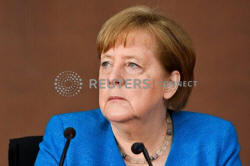Germany's Merkel rejects criticism of her Wirecard
lobbying in China
 Send a link to a friend
Send a link to a friend
 [April 23, 2021] By
Christian Kraemer and John O'Donnell [April 23, 2021] By
Christian Kraemer and John O'Donnell
FRANKFURT (Reuters) -German chancellor
Angela Merkel rejected criticism of her lobbying for Wirecard in China
months before it collapsed, telling lawmakers she had no reason to
suspect the firm of criminality as she sought to help it do business
there.
Her detailed account of events leading to a state visit to China in
September 2019 shone a rare light on the inner workings of government
and its lobbying for business, marking the climax of a public inquiry
into the country's biggest post-war fraud.
Wirecard, which began by processing payments for gambling and
pornography, had been hailed as a rare German technology success story,
although few really understood it. Once valued at $28 billion, it
abruptly unravelled last year.
In her testimony, Merkel outlined how Wirecard's aim of buying a Chinese
company fitted in with her agenda of helping German companies on the
trip, lobbying she described as a normal part of her job.

"What is known since Summer 2020 ... about Wirecard was not known in
2018/2019," said Merkel, adding: "There was no reason to think that
there were serious irregularities, in spite of press reports."
Merkel gave a vague account of her meeting, shortly before her journey
to China, with Karl-Theodor zu Guttenberg, a former German economy
minister who lobbied on behalf of Wirecard, saying she did not remember
if he brought up the company.
Highlighting the fact that EY, Wirecard's auditor, had signed off on the
company's accounts and emphasising that she had no reason to doubt the
information she had been given by the Finance Ministry, Merkel
emphasised her ignorance at the time.
"There is no 100% protection against criminal behaviour," she said.
Merkel is the latest politician to wash her hands of the scandal, after
Olaf Scholz, her deputy, blamed Wirecard's auditor, EY, for failing to
catch the fraud. EY has said it acted professionally.
A host of other officials have rejected responsibility, saying they
should not be blamed for the mishaps that led German authorities to
pursue the company's critics for years rather than examine Wirecard
itself.
[to top of second column] |

German Chancellor Angela Merkel is seated prior to testifying in
front of a parliamentary committee investigating the financial
scandal over payment systems provider Wirecard in Berlin, Germany
April 23, 2021. John MacDougall/Pool via REUTERS

Much evidence uncovered by the inquiry suggests German officials acted in
ignorance, although lawmakers believe Wirecard's use of former politicians and
intelligence officials for lobbying helped shield it from critics.
Germany's fragmented patchwork of regional authorities, all with a role to play
in holding Wirecard to account, meant that the company was largely given free
rein.
Lawmakers say that the German government was biased in favour of the company,
turning a blind eye to allegations of irregularities in the run up to its
collapse.
"The Chancellor lobbied for Wirecard with the most powerful man in China," said
Fabio De Masi, one of the lawmakers leading the public inquiry, asking why she
gave it such priority.
In power since 2005, Merkel remains popular, although her legacy, such as her
2015 decision to open Germany's borders to refugees fleeing war in the Middle
East, divided opinion.
The Wirecard debacle tarnished her government's reputation by shining a
spotlight on the lengths some German politicians have gone to in order to
support companies.

Stephan Klaus Ohme of Transparency International said it had exposed cracks in
Germany's laissez-faire model towards industry, leaving companies largely to
their own devices.
"In Germany, you should stick to the rules but if you don't, nothing happens.
The penalties are laughable," he added.
($1 = 0.8329 euros)
(Additional reporting by Paul Carrel and Tom Sims; Writing by John O'Donnell;
Editing by Alexander Smith and Elaine Hardcastle)
[© 2021 Thomson Reuters. All rights
reserved.] Copyright 2021 Reuters. All rights reserved. This material may not be published,
broadcast, rewritten or redistributed.
Thompson Reuters is solely responsible for this content. |